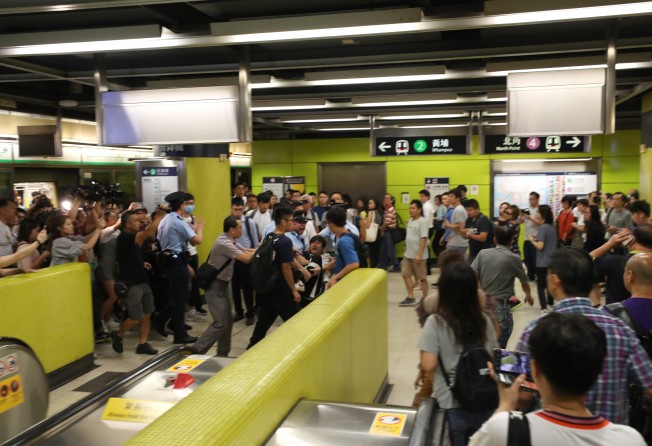
Protesters disrupt Hong Kong’s MTR train services with non-cooperation campaign in new front against controversial extradition bill
- Group of unnamed protesters place adverts in newspapers and spread invitations online targeting MTR and cross-harbour tunnels
- Carriage doors blocked and emergency stop buttons hit on trains, slowing service

A day after violent protests rocked the heart of Hong Kong, protesters trying to stop an unpopular extradition bill opened a new front on Thursday – disruption of public transport services, much to the annoyance of commuters affected.
A group of unnamed protesters placed adverts in newspapers and spread invitations online targeting the MTR metro system and cross-harbour tunnels in a non-cooperation campaign.
They also urged workers to strike and students to skip classes in a bid to force the government to withdraw its bill, which, if passed, would allow fugitive transfers to mainland China. Critics say the amendments to fugitive laws would leave Hongkongers at risk of unfair prosecution across the border.
In the adverts, the group called on the public to strictly follow rules and regulations and also to help passengers who fell ill at key MTR interchange stations.

Motorists were also urged to be careful in the Cross-Harbour and Eastern tunnels – a call to drive slowly – and act responsibly by stopping their vehicles at a safe location if they appeared to have problems.
In incidents seen as connected to the campaign, service on the Kwun Tong line, which runs between Whampoa in Hung Hom and Tiu Keng Leng in Tseung Kwan O, took longer than usual at one stage because of minor issues.
MTR Corporation head of operating Alan Cheung Kwan-hing said disturbances were recorded on 20 trains, which delayed services by as much as 20 minutes. Of these, 18 involved obstruction of carriage doors. They were 10 occasions where the emergency button was pressed. A train door was also found to be slightly open midway through a journey to Tiu Keng Leng.
“Having a train door open is very dangerous. It may lead to passengers falling onto the rail track. But luckily our system was able to detect the problem and the driver immediately handled it and drove the train back to the repair station,” Cheung said.
“The emergency button is for passengers who need to contact MTR staff for immediate help. If it is not used properly, it will affect our staffing and deprive those who really need care.
“We urge all passengers to take care of themselves as well as others. Do not obstruct train doors or train operations, as this will affect their own and other travellers’ safety while delaying the journey of others.”
Cheung said the MTR had increased the number of staff at stations and the control centre.
Television footage showed youths in black T-shirts and wearing masks, some with luggage, gathering around Tiu Keng Leng and Lam Tin stations, with one saying he came to enjoy free air conditioning.
At Tiu Keng Leng station, some stood dangerously between train doors and platform screen doors. One even sat down and asked for help to get his trapped right leg out the platform gap.
On board a train, a passenger was seen lying on the floor and being helped by paramedics.
Some commuters were annoyed, urging the passengers in question not to disrupt their trip to work.
On Wednesday, clashes broke out between hundreds of protesters and police when the demonstrators occupied roads near the Legislative Council at Tamar in Admiralty to try to stop lawmakers from resuming the debate on the controversial bill. At least 11 people were arrested.
The MTR Corp closed Admiralty station between 8.30pm on Wednesday and 2.14pm the following day following a police request. While not directly addressing whether the MTR was required to fulfil police requests, Cheung said the decision to close the station was made to ensure a smooth trip for commuters.
He said the corporation worked with police on crowd management for peak events such as festivals and fireworks shows.
Cheung also said the decision to allow people at Admiralty station to go through the turnstiles without a ticket was made by the head of the station to ensure passenger safety. Commuters were required to pay after explaining the situation at their destinations.